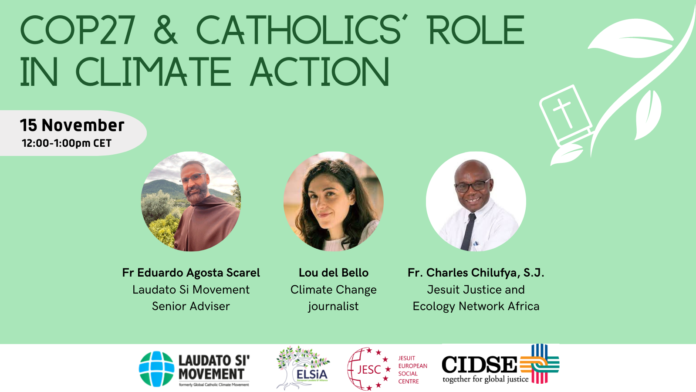Two experienced, inspiring and knowledgeable speakers. A brilliant moderator. All three of them attended COP27 in Egypt. An urgent and threatening topic, an engaged and concerned audience: this was the context for ELSiA’s latest webinar titled “COP27 & Catholics’ role in climate action”, which took place on Tuesday November 15.
During the one-hour long webinar, Fr Eduardo Agosta Scarel and Fr Charles Chilufya sj as speakers; climate journalist Lou del Bello as moderator; and the diverse and international audience engaged in two key, basic issues:
- What are Catholics doing at the United Nations Climate Change Conference in Egypt (COP27)?
- What can Catholics do in their daily lives to help address climate change?
Fr Scarel reminded us that this COP is different for the Church because it’s the first time the Vatican is officially a party to it, whereas before it only participated as an observer. As an official party, it can now make policy decisions, beyond just providing moral guidelines. Additionally, Catholic presence at the COP through civil society is crucial, according to Fr Scarel. He recalled Pope Francis’ request “to make our voices heard” or as we would say in Argentina “hacer lío”. And this is what Catholics are doing at Sharm.
As a climate scientist himself, Fr Scarel recalled that already in 1987 we trespassed the threshold of 350 ppm (parts per million) of CO2 in the atmosphere. The Paris Agreement was a successful building block in our fight against climate change, but we still haven’t made enough efforts nor necessary changes. He mentioned three pillars that need to be addressed at the COP:
- Loss and damage finance,
- Just transition,
- Decarbonization / fossil fuel phase out.
Fr Chilufya made reference to how Catholics are amplifying the cry of the poor. He mentioned how during the past year, in Africa, there were organised talks with people on the ground suffering the effects of climate change now. He highlighted the importance of raising their voices to showthat climate change is a reality. He also clarified that the so-called Global South demands justice, not charity.
Regarding what Catholics can do in their daily lives, Fr Scarel referred to an ecological conversion of daily life changes. He suggested that we can fulfil our inner longings and desires in ways that go beyond consumption, like encounter with others and helping others. He referred to the wise and well known words that “less is more”: we can consume less (less energy, less products). Because, of course, human life is not just about consuming. However, when it comes to the economy (which is based on consumption, and produces the stuff we consume), it should be decarbonized. Fr Scarel also mentioned new ways of relating ourselves to nature. As a last and highly relevant reflection, he said that when we humans do not see or feel a problem directly, we often find it hard to react to it, which is why it’s taking human civilization so long to properly react to climate change. To address this, he suggested we try to get in touch with, and help others get in touch with the suffering of others, mainly those experiencing climate change. Because, as Fr Scarel said, “if our emotions are not touched, knowledge is not enough.”
Fr Chilufya referred to businesses as one of the actors that can help contribute to the needed changes. Because “if we continue to do business as usual we will kill ourselves.” Fr Chilufya reminded and inspired us by recalling that God has given us immense power to act differently and to create the future we want. He was also optimistic about the fact that some changes are already underway, and he said that we need to actually show these examples to give hope. As Fr Scarel, Fr Chilufya also advised to consume wisely.


